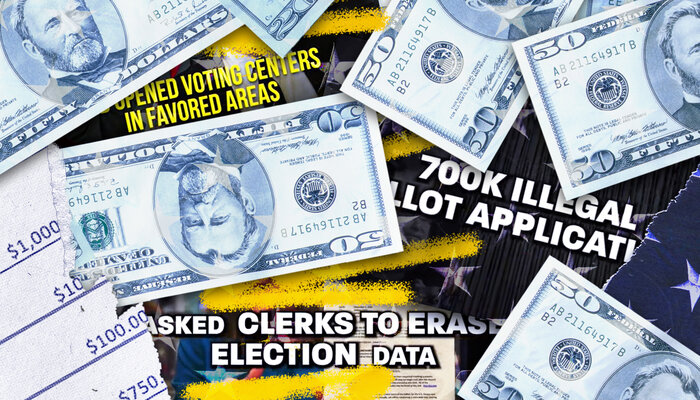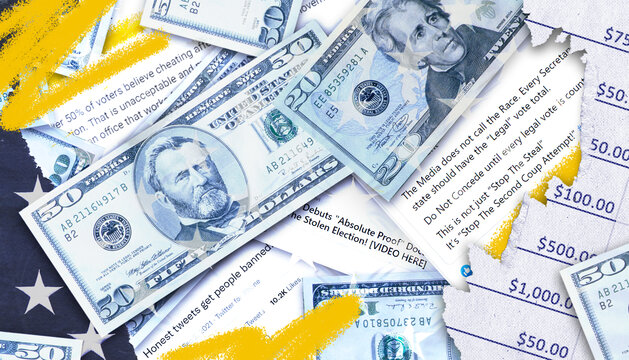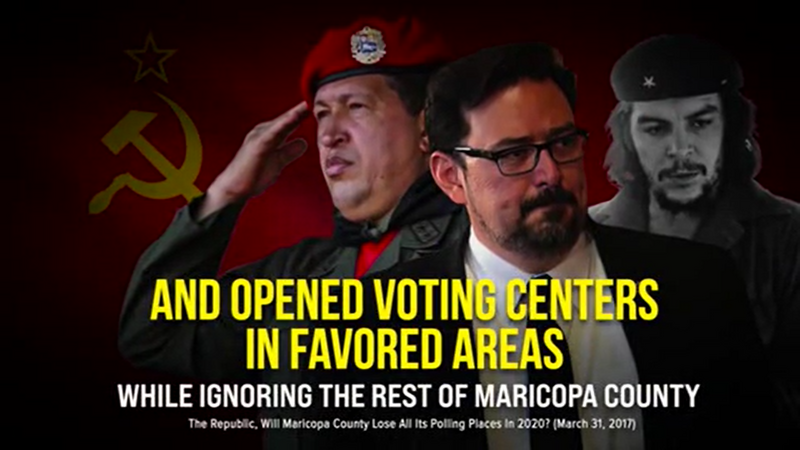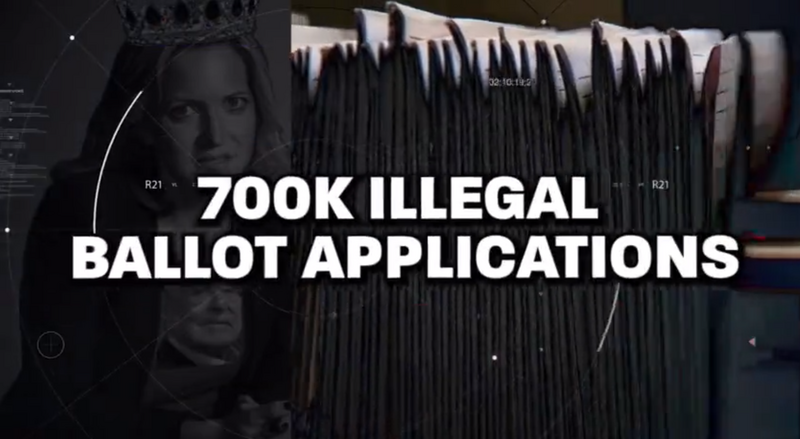Donations to secretary of state candidates in battleground states this election cycle far exceed those of past elections, showing the enormous increase in the prominence of these races and the attention partisans are paying to them. Across six states, candidates have collected $26.4 million. That’s more than double the $11.8 million amassed by this point in 2018 — which was itself double that of the $4.6 million raised in the 2014 cycle.
Election deniers in secretary of state races are behind
In every battleground state with an election denier on the November ballot for secretary of state, the election denier is losing the money race, with some being outraised by a factor of four to one. What’s more, opponents of election denial are benefiting from multimillion-dollar independent expenditures. This contrasts with the situation earlier this year, when election deniers were the leading fundraisers in multiple states, raising the possibility that election denial was a better fundraising strategy for the primary than for the general election.
In Arizona, where the secretary of state is an open seat, Adrian Fontes (D) has lagged election denier Mark Finchem (R) in fundraising all year, but he surged ahead after winning the primary in August. Fontes raised $1.7 million in the last quarter, almost three times what Finchem collected during the same three months.
A similar story is unfolding in Nevada, where Cisco Aguilar (D) raised $1.2 million in the last quarter, exceeding what he had raised in the entire cycle through June. Over the same period, election denier Jim Marchant (R) took in $90,000. Aguilar’s total revenue of $2.3 million is four times more than Marchant’s $526,401.
In Michigan and Minnesota, incumbents Jocelyn Benson (D) and Steve Simon (D) have for the whole cycle maintained commanding fundraising leads over their election denying opponents, Kristina Karamo (R) and Kim Crockett (R). As of September, Benson and Simon each a have four-to-one advantage over their opponent in campaign cash.
The financial edge by opponents of election denial is a pivot from earlier in the year (setting aside the consistent dominance of some incumbents). In the spring, election deniers were the top fundraisers in Georgia (Republican Jody Hice) and Arizona (Mark Finchem), and three of the four top fundraisers in Nevada were election deniers. Since then, Hice was eliminated in the primary, leaving no election denier on the ballot in Georgia. Finchem was vastly outraised in the third quarter. And prominent election denier Jim Marchant has seen donations drastically decline since he won the Nevada GOP primary.
It appears that election denial was a stronger asset to fundraising in the primary season than it has been in the general. Candidate strategy may have played a role in this. Our analysis of social media ad spending shows that many candidates’ ad buys peaked shortly before their state’s primary. Notable election deniers Finchem and Marchant stopped running online ads after winning their primaries, though Finchem started again in October.
Adding to the imbalance in direct contributions to candidates, super PACs and other outside groups are spending millions to stop the election deniers in all four states. Outside groups have announced enormous ad buys in support of Fontes in Arizona, including $5 million from iVote, and a $10 million plan from the Democratic Association of Secretaries of State (DASS) to benefit Fontes and Georgia secretary of state hopeful Bee Nguyen. DASS plans to buy $11 million worth of ads across Michigan, Minnesota, and Nevada, and iVote spent $4 million to support Benson and Simon. Several candidates will be outspent by supportive super PACs.
Notably, this outside group spending is completely lopsided. There are no significant independent expenditures supporting the election deniers in any of these contests.
Multimillion-dollar independent expenditures are common in competitive gubernatorial races, but they appear unprecedented for secretary of state contests. In states where past independent expenditure data is readily available, outside spending for a secretary of state candidate has previously not topped $1 million.
This heavy independent spending by national groups is one sign that secretary of state races have been nationalized. Another is the high rate of out-of-state contributions to candidates. Arizona’s Finchem has relied on out-of-state donors for the majority of his funds all cycle. And as donations to his opponent exploded late in the race, the share of Fontes’s money from other states shot up as well. Before July, Fontes had been taking in about $1 of every $5 from out of state, but almost half of the $1.7 million he raised in the third quarter came from outside Arizona. In Michigan, 41 percent of donations to both parties’ nominees have come from residents of other states.
Social media ad spending data indicates candidate strategies may have encouraged out-of-state giving. Analysts used the NYU Ad Observatory and the Meta Ad Library to examine ads on Facebook and Instagram for secretary of state nominees. In six battleground states, 8 of the 11 secretary of state nominees who bought Facebook or Instagram ads have targeted some ads to residents of other states. Election deniers are more likely to do so: on average, more than half of ads from election deniers target the entire nation, compared to only 13 percent for other candidates. Finchem aimed 97 percent of his ads to national audiences instead of just Arizona.
Election deniers in gubernatorial races are behind in fundraising
The pattern of election deniers being outraised is largely the same in battleground gubernatorial races. This is the case in Arizona, Michigan, Minnesota, Nevada, Pennsylvania, and Wisconsin. In Michigan and Pennsylvania, election deniers have been outraised 10-to-1. The one exception is Florida Gov. Ron DeSantis (R), who has endorsed election denial theories (although only for results in other states). Perhaps due to widespread expectations of a presidential run, DeSantis has raised more than any gubernatorial candidate ever: $180 million. Unlike secretary of state races, however, there is heavy spending on both sides from parties and super PACs in many of these gubernatorial contests.
Election deniers have mixed success in money races for local offices
We are tracking several local races where election deniers are on the November ballot for positions that play a role in election administration. Election deniers have raised more money in most of them.
In Nevada’s Nye County and Storey County, election deniers are running for county clerk, the office that administers county elections. Both are incumbents who were appointed this year to fill open seats after prior clerks left amid a wave of resignations driven by disinformation-fueled harassment and death threats. Another two election deniers are running for seats on the Washoe County Commission. The commission certifies county election results and appoints the registrar of voters, who runs elections in Washoe.
Through the summer, election deniers were ahead in fundraising in all four races. (The Storey County election is uncontested.) But that changed with a late surge for Washoe County’s Edwin Lyngar (D), who has expressly opposed election denial. Lyngar’s campaign for the District 5 seat on the county commission raised over $48,000 in the third quarter.
Election denial has also been an issue in the race for Travis County clerk in Texas, a position that administers the election on the county level. Although the publicly available campaign finance data may not be complete, it is clear that Dyana Limon-Mercado (D) has a commanding financial lead over election denier Susan Haynes (R). Limon-Mercado has reported raising more than $58,000, while Haynes has reported $2,234.








